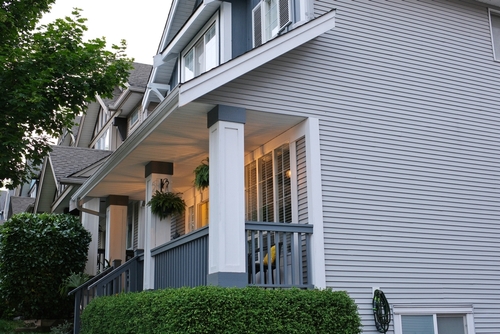As an HOA member, you’re required to pay dues or fees to join the community. That said, it’s important to know where your money goes. Part of the reason you pay dues is to cover HOA insurance. But what does that mean, exactly? Today, we’ll discuss HOA insurance, what it covers, and whether or not you need additional coverage for your property.
 Contents of This Article:
Contents of This Article:
- What Is a Homeowners Association?
- What Does HOA Insurance Cover?
- HOA vs. Homeowners or Condo Insurance
- FAQ About HOA Insurance
- Find the Best Management for Your HOA
What Is a Homeowners Association?
A homeowners association (HOA) is a private organization often found in residential communities where homeowners pay fees in exchange for certain services.
HOAs are run by a board of directors, typically resident homeowners or volunteers, who oversee the HOA’s management. They ensure that common areas are maintained and enforce rules that preserve the community’s appearance. Otherwise, they hire a Philadelphia property management company to help oversee the HOA.
As a community member, you’re required to pay dues or fees that cover things like insurance, common area maintenance, access to amenities, and more. Most HOA members care about where their money goes. So, if you want to know more about how HOA insurance works, read along as we discuss what it covers, what it doesn’t cover, and why it’s necessary.
What Does HOA Insurance Cover?
HOA insurance, funded through dues or fees, is a form of commercial property insurance. Board members purchase the insurance and pay the premiums using funds from dues paid by HOA members. Since members have equal access to common areas, they pay an equal portion when they pay their regular dues.
That said, HOA insurance typically covers physical damage to HOA-managed structures and general liability expenses related to common areas. Here’s what HOA insurance generally covers.
Physical Damage Coverage
Physical damage coverage helps repair or replace damage in community areas like parks and playgrounds. For condo HOAs, it covers the exterior of buildings, like replacing lost roof shingles and shared internal areas like stairwells and basements. That said, HOA insurance typically includes protection against damage from natural disasters, fires, storms, and vandalism.
General Liability
General liability coverage includes the HOA’s legal representation and any payouts or settlements if someone files a lawsuit after sustaining injuries in a common area. For instance, if a guest slips and falls on an icy sidewalk in the neighborhood park, it may result in a costly legal dispute. However, HOA insurance may help cover the costs, reducing the need for additional assessments or fees to cover them.
 What’s Not Covered By HOA Insurance?
What’s Not Covered By HOA Insurance?
HOA insurance only covers property damage or liability for injuries that happen in common areas. It doesn’t cover damage or injury liability on your property or inside your home or condo. Additionally, it usually does not cover damage caused by floods or earthquakes.
Ultimately, HOA insurance does not cover the following scenarios:
- Physical damage to your home or condo
- Lost or stolen personal belongings, even if it’s stolen from a common area
- Damage to common areas caused by an earthquake
- Liability expenses you’re responsible for (if you personally caused damage to someone’s property)
- Claims that exceed policy limits
HOA vs. Homeowners or Condo Insurance
Now that we’ve reviewed what HOA insurance covers, it’s important to understand other options as well. The coverage of HOA insurance is pretty clear–it only covers damage or liability claims related to common areas. As such, homeowners within the HOA need to get their own homeowners policies.
A standard homeowners insurance policy covers your home’s structure, structures on the property, personal property, liability coverage, and more. However, it ultimately depends on the type of home insurance policy you choose.
When you own a home within an HOA, the difference in coverage is pretty clear–HOA insurance covers shared spaces, while you’re responsible for covering your own property. The coverage does not overlap.
What Does Condo Insurance Cover?
If you live in a condo association, a condo insurance master policy may cover the building’s exterior and some shared common areas. However, it’s still important to get your own condo insurance policy to protect the interior of your unit. Like homeowners insurance, a personal condo insurance policy covers your personal property, like furniture, clothes, and electronics, and provides liability protection.
That said, there are a few different types of condo association insurance policies, including bare walls coverage, walls-in coverage, and all-in coverage. Bare walls coverage from an HOA policy is the least comprehensive and only covers the exterior of your building, like the walls, roof, and studs inside the condo.
Walls-in coverage is the most common type of coverage an HOA provides. It covers the condo’s exterior, plus some basic interior features and fixtures, like drywall, paint, flooring, cabinetry, built-in appliances, and light fixtures.
Finally, all-in coverage is the most inclusive type of coverage and covers everything that walls-in coverage does, along with the homeowner’s upgrades and enhancements. So, if you want to remodel your bathroom or kitchen, this policy will cover your updated appliances. That said, if your condo association has an all-in master policy, you may not need to add dwelling coverage to your individual condo insurance policy.
FAQ About HOA Insurance
The ins and outs of any type of insurance can be confusing. If you still have questions about your community’s insurance, here are some answers that may help.
- Who Buys and Pays for HOA Insurance?
 Typically, board members are responsible for choosing which type of insurance to get. However, they can hand over this responsibility to a professional management firm, like Bay Property Management Group. From there, premiums are paid by the members of the HOA community through regular dues or fees.
Typically, board members are responsible for choosing which type of insurance to get. However, they can hand over this responsibility to a professional management firm, like Bay Property Management Group. From there, premiums are paid by the members of the HOA community through regular dues or fees.
- What Does HOA Insurance Cover?
HOA insurance only covers physical damage to shared amenities and community property against natural disasters, vandalism, and liability claims. It does not cover home insurance for members of its community. They are responsible for getting their own home insurance policy to protect their home, belongings, and personal liability.
- How Much Does Insurance Actually Cost?
Policy premiums may differ depending on which type of coverage your HOA chooses. As such, the amount that HOA members pay depends on the coverage limits, how many members live in the community, and other factors.
- Is HOA Insurance Required?
Every HOA should have insurance to protect the association from property damage and liability claims that occur in shared spaces. If the association does not have insurance, the condo or homeowners would be responsible for paying these costs–which can potentially cost thousands of dollars out of pocket. Additionally, the HOA may incur legal costs or responsibility if they’re sued without insurance.
Find the Best Management for Your HOA
It’s important for HOA community members to know where their money goes when they pay dues or fees. Depending on the size, policy coverage, and nature of the community, insurance is one of the main expenses. That said, it’s important to know what the insurance covers and what additional coverage members may need.
Need More Advice? contact us today!
If you’re looking for a comprehensive team to help manage your HOA community, look no further than Bay Property Management Group. Our team of experienced property management professionals can help with all of your HOA needs, including preparing annual budgets, performing property inspections, coordinating meetings, and more. Contact us today to learn more about how we can help your community today!

 Contents of This Article:
Contents of This Article:  What’s Not Covered By HOA Insurance?
What’s Not Covered By HOA Insurance?